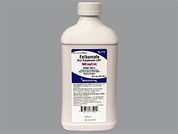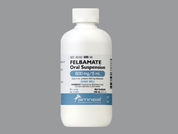Felbamate
Generic of Felbatol
What is Felbamate used for?
Felbamate is used to treat severe seizures. This medication should be used only when you cannot take other medications or when other medications have not been able to control your seizures. Felbamate is known as an anticonvulsant or anti-epileptic drug.
CHEMICAL NAME
DRUG TYPE
SeizuresFelbamate Prices
Searching for the lowest prices
Felbamate Frequently Asked Questions
Your condition can cause complications in a medical emergency. For information about enrolling in MedicAlert, call 1-888-633-4298 (US) or 1-800-668-1507 (Canada).
IMPORTANT: HOW TO USE THIS INFORMATION: This is a summary and does NOT have all possible information about this product. This information does not assure that this product is safe, effective, or appropriate for you. This information is not individual medical advice and does not substitute for the advice of your health care professional. Always ask your health care professional for complete information about this product and your specific health needs.



